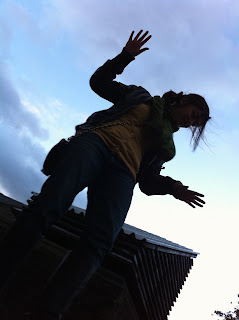I think that something between 50 and 90% of the ‘trance’ states I witnessed last night were some kind of performance, created by expectation, pressure and necessity.
It works like this: some men (chosen men?) drum. Chosen women dance. No-one in the whole community apart from the chosen women ever dances publicly, I’m told. The chosen women are called ‘Marie Santos’. Candomblistas (all or some, I don’t know), live in compounds around the Terreiros, their churches. The communities are deeply hierarchical, with a kind of King and Queen who sat in thrones last night and held most of the ceremony. The Queen / Matriarch identifies which women in the community should become Marie Santos, sometimes before they are born. It takes 7 years to prepare to be a MarieSantos (MS), the youngest of whom are therefore 7 years old.
Marie Santos’ are, I am told, sensitive to spirit and quite good at getting into trances. This is useful because the Orixas (Candomble Gods) have a profound impact on how your life works out, if you’re into them, and you mainly connect with the Orixas through the Marie Santos’ – their energy, words and actions when they’re in a possession trance, and their ability to interpret shells thrown in divination.
Once you’re a Marie Santos, you’re a Marie Santos, and you’re not anything else. You might marry and bear Children, if the Orixas say so, or be celibate, if they say so, but basically it’s up to them once you’re a MS.
Economically, the communities appear to depend entirely upon the MSs, for they generate income through divinations for those interested in their own destinies, and various acts of healing.
All this is to say, when you’ve been trained to be a Marie Santos for 7 years, and that’s your place on this earth, and your community depends on you, and your trance is the way of showing that you’re fit for the job… When it’s time to get into a trance (and it’s a specific point in the ceremony), you bloody well act like you’re in a trance, trance or no trance.
Acting like you’re in trance, as far as I could see last night, involves dancing like you really feel the music, keeping your eyes closed, rocking when the music’s stopped to keep the energy going, and making loud noises from time to time. And occasionally kind of flopping or rolling around.
People like the loud noises. (This comes up again and again and again in the stuff I look into. People LOVE making loud noises. They design them into proceedings at every given opportunity, and if not, they just get pissed and do it anyway.)
If you’re not dancing, you’re probably singing, and you get to do this loud too and have a good old yell at the climax at the end where everybody just basically makes as much noise as possible while the dancers go totally wild.
The lack of freedom in the lives of the MSs feels pretty shocking to my liberal mind, but thinking about it, the alternatives aren’t much more palatable in this provincial economy; look after the kids, cook and clean; work in a shop, restaurant or maybe the bank; for the bright few, work in public services like education, health and local government, and still look after the kids and do all the cooking and cleaning.
So being a bit special and wearing fantastic dresses and getting to boogie like a raver to wicked rhythms probably isn’t a bad end, all in all.
I don’t know what the men who aren’t drummers do. There were six drummers last night, in two shifts of three (it’s intense). (About 40 or so Marie Santos). A handful of men wore ceremonial clothes and sat in the corner being generally encouraging. One of them was a trannie.
The rest stood around the edge in the men’s area (I stood on the other side with the women), holding their hands out to the dancers like you would to a fire, to kind of soak up the vibes. And also, I guess, to say, I'm in, count me in on these shenanigans (and please feed me).
At the end of their bit the dancers go around and hug everyone to share the vibes.
What with dancers and watchers and helpers, the room was totally packed with people crowding at the windows. In a tiny, tiny village in the middle of nowhere, over 130km from the nearest city.






